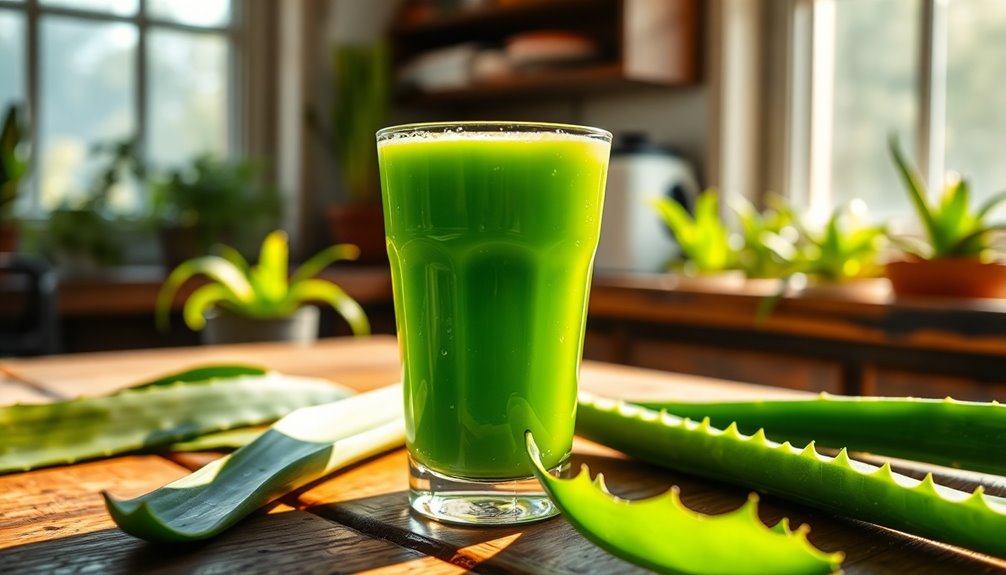Aloe vera juice can be beneficial for hydration and may provide health perks like improved skin and digestion. However, it's not all good news—overconsumption can lead to gastrointestinal issues, diarrhea, and potential interactions with medications. Certain groups, like pregnant individuals and those with diabetes, should exercise caution. While it has its advantages, you should weigh the risks carefully. Keep going to uncover more about how to safely enjoy aloe vera juice and its effects on your health.
Key Takeaways
- Aloe vera juice is low in calories and rich in vitamins, offering potential nutritional benefits when consumed in moderation.
- Its antioxidants may help combat oxidative stress, promoting overall health and wellness.
- Drinking aloe vera juice may improve digestive health and relieve constipation due to its natural laxative properties.
- Excessive consumption can lead to gastrointestinal issues, dehydration, and may interact with certain medications, causing potential risks.
- Pregnant individuals and those with specific health conditions should avoid aloe vera juice due to possible complications.
What Is Aloe Vera Juice?
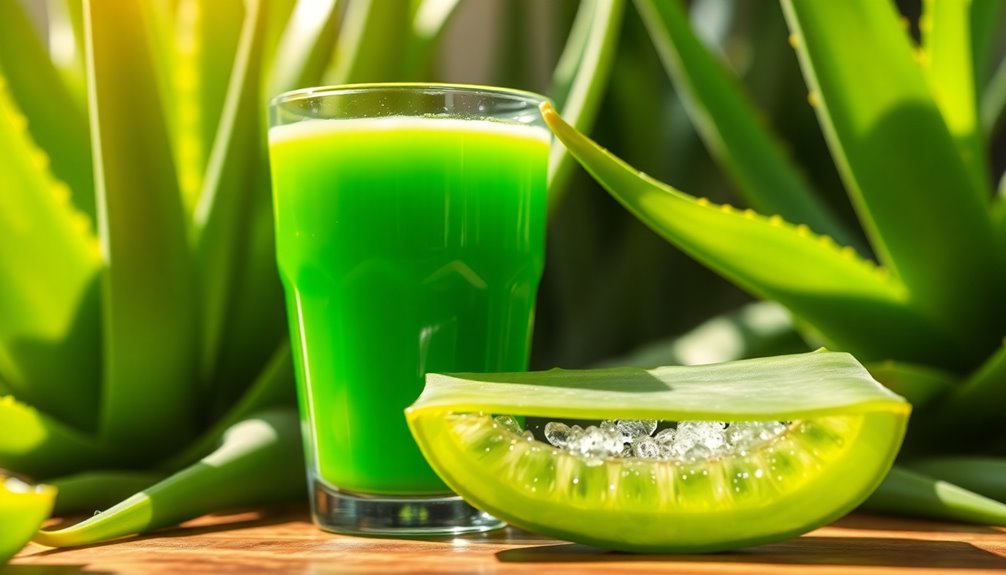
Aloe vera juice is a drink made from the gel of the Aloe barbadensis plant, specifically extracted from the inner fillet of its leaves.
This juice is created by mixing the gel with water, resulting in a drinkable form that's free from chemicals or fragrances. You'll notice its slightly bitter taste and thick consistency, which sets it apart from the topical aloe vera gel you might use for skin applications.
With around 37 calories per eight-ounce serving, aloe vera juice is rich in vitamins, enzymes, and amino acids.
Many people view it as a potential health elixir due to the health benefits of aloe, though further research is needed to fully understand its effects on health.
Benefits of Drinking Aloe Vera Juice
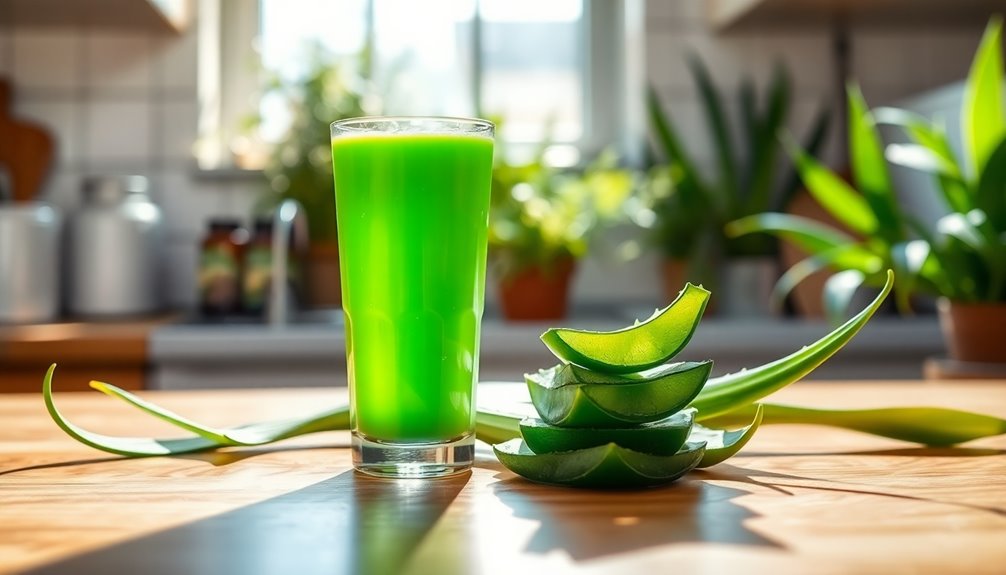
While many people seek natural ways to enhance their health, drinking aloe vera juice offers a range of potential benefits worth considering.
One of the key benefits of aloe vera is its rich antioxidant content, which may help protect your body from oxidative stress, potentially lowering the risk of heart disease and certain cancers.
If you struggle with constipation, the natural laxative properties of aloe vera juice can provide relief within hours.
Additionally, it may improve skin health by boosting collagen production, enhancing elasticity, and reducing wrinkles.
For those at risk of diabetes, preliminary research suggests it could lower fasting blood sugar levels.
Finally, drinking aloe vera juice promotes digestive health by encouraging beneficial gut bacteria, improving overall gut function.
Health Risks and Concerns
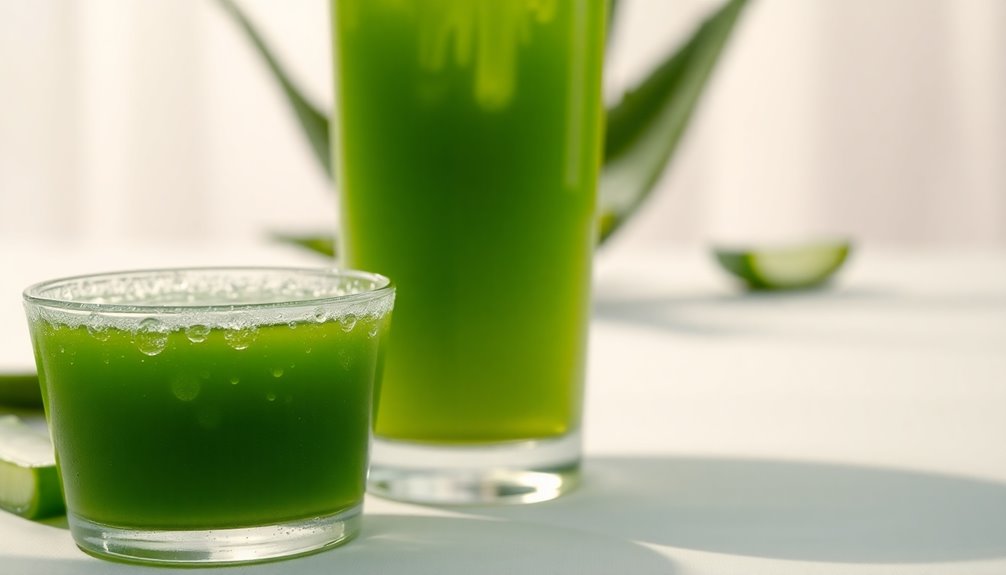
Although many people enjoy the potential benefits of aloe vera juice, it's essential to be aware of the health risks and concerns associated with its consumption.
One of the main side effects is bowel irritation, leading to diarrhea, which can cause dehydration and dangerously low electrolyte levels. The FDA has even removed aloe vera laxatives from over-the-counter sales due to safety concerns.
Additionally, aloe vera juice can interact with prescription medications, potentially lowering drug absorption and causing adverse effects. If you have diabetes, excessive consumption may lower blood sugar levels, posing further risks.
Pregnant individuals should also avoid aloe vera juice, as it may stimulate the uterus and increase the risk of complications. Furthermore, regular consumption of certain herbal teas, such as chamomile tea, has been linked to better sleep quality and mood improvement, providing a safer alternative for relaxation.
Always consider the safety of aloe vera before consuming it.
Who Should Avoid Aloe Vera Juice?

Certain groups of people should steer clear of aloe vera juice to avoid potential health risks.
If you have underlying medical conditions like diabetes or bleeding disorders, the risks of drinking aloe can be significant, as it may lower blood sugar levels and thin your blood.
Pregnant individuals should also avoid aloe vera juice, as it could stimulate the uterus and jeopardize the pregnancy.
Additionally, if you’re on prescription medications, check with your doctor, since aloe vera juice can interfere with drug absorption. It’s essential to consider the potential aloe vera juice health risks, especially for individuals with pre-existing medical conditions or those taking multiple medications. Some studies suggest that excessive consumption of aloe vera juice may lead to gastrointestinal issues or other side effects. Always consult with a healthcare professional to ensure that incorporating aloe vera juice into your diet is safe and beneficial for your individual health needs.
Those with kidney issues or gastrointestinal disorders like Crohn's disease should refrain from consuming it, as it may worsen your condition.
Always consult a healthcare professional before adding aloe vera juice to your diet.
Bottom Line on Aloe Vera Juice
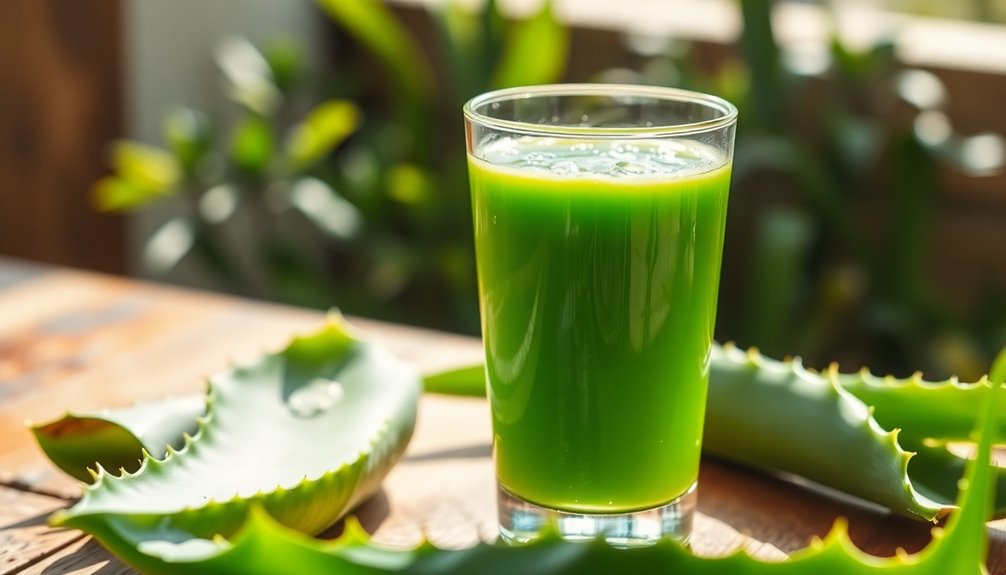
Aloe vera juice can be an invigorating addition to your diet, offering hydration and a few potential health benefits.
It's low in calories, making it a rejuvenating choice for those looking to improve their nutrition. While some scientific research indicates that aloe vera juice may aid digestive health, excessive consumption can lead to gastrointestinal issues like diarrhea and cramping.
It's also worth noting that the FDA has flagged certain aloe vera laxatives as unsafe, raising concerns about the safety of using aloe vera juice for constipation relief.
If you have underlying health conditions or take prescription medications, consulting a doctor before incorporating aloe vera juice into your routine is essential.
Frequently Asked Questions
Does Drinking Aloe Vera Juice Really Work?
Drinking aloe vera juice can have some benefits, but it's not a miracle solution. You might find it helps with constipation or even supports your gut health by promoting good bacteria.
Some studies suggest it could aid blood sugar control, but more research is needed. While it's rich in antioxidants, the direct health benefits from drinking it compared to topical use are still unclear.
Moderation is key, as too much can lead to digestive issues.
What Happens if We Drink Aloe Vera Juice Every Day?
Imagine your body as a garden. If you water it wisely, it flourishes; overwater it, and it drowns.
Drinking aloe vera juice every day can hydrate and nourish your garden, but moderation's key. One cup's usually safe, but too much might lead to cramping or dehydration.
Keep an eye on how your body reacts, especially if you have any health issues.
Listen to your garden; it knows what it needs.
What Is the Dark Side of Aloe Vera?
When you consider the dark side of aloe vera, you should be cautious.
While it's often praised for its benefits, high doses can lead to gastrointestinal irritation, causing diarrhea and dehydration.
If you're diabetic, it can dangerously lower your blood sugar.
Plus, it might interact with your medications, affecting their effectiveness.
Pregnant individuals should steer clear, as it might provoke uterine contractions.
Always weigh the pros and cons before adding it to your routine.
Is Aloe Vera Juice Good for Your Kidneys?
If you're considering aloe vera juice for your kidneys, you should be cautious.
It has diuretic and laxative effects that can lead to dehydration and electrolyte imbalances, especially if you already have kidney issues. Excessive consumption might even result in kidney damage over time.
It's vital to consult a healthcare professional before adding it to your diet, as it could interact with medications and worsen kidney function.
Stay informed to protect your health!
Conclusion
In the grand tapestry of health, aloe vera juice can be a vibrant thread, weaving benefits into your daily routine. However, tread carefully, as it may not be the elixir for everyone. If you've got certain health issues or are pregnant, it's wise to steer clear. Ultimately, like a double-edged sword, it can either enhance your well-being or pose risks. So, sip with awareness, and let nature's gift work its magic, but always know your limits.
Cindy thoroughly researches juicing trends, techniques, and recipes to provide readers with practical advice and inspiration. Her writing style is accessible, engaging, and designed to make complex concepts easy to understand. Cindy’s dedication to promoting the advantages of juicing shines through her work, empowering readers to make positive changes in their lives through the simple act of juicing.

